Nsc 3260 - Study guides, Class notes & Summaries
Looking for the best study guides, study notes and summaries about Nsc 3260? On this page you'll find 17 study documents about Nsc 3260.
All 17 results
Sort by
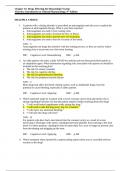
-
Chapter 14: Drugs Affecting the Hematologic System Visovsky: Introduction to Clinical Pharmacology, 9th Edition Latest Exams & Review, A+ Guide
- Exam (elaborations) • 10 pages • 2023
-
- $9.49
- + learn more
1. A patient with a clotting disorder is prescribed an anticoagulant and asks you to explain the purpose of anticoagulant therapy. What is your best response? a. Anticoagulants are used to lyse existing clots. b. Anticoagulants are used to increase the flow of blood. c. Anticoagulants are used to prevent new clot formation. d. Anticoagulants are used to thin the viscosity of the blood. ANS: C Anticoagulants are drugs that interfere with the clotting process, so they are used to reduce ex...
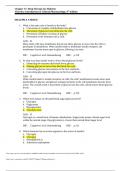
-
Chapter 17: Drug Therapy for Diabetes Visovsky: Introduction to Clinical Pharmacology, 9th Edition
- Exam (elaborations) • 9 pages • 2023
-
- $9.49
- + learn more
1. What is the main role of insulin in the body? a. Conversion of complex carbohydrates into glucose b. Movement of glucose from blood into the cells c. Prevention of kidney excretion of glucose d. Prevention of the formation off at cells ANS: B Many body cells have membranes that do not allow glucose to move into the cells to participate in metabolism. When insulin binds to membrane insulin receptors, the membranes become more open to glucose, allowing it to enter. DIF: Cognitive Level...
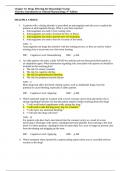
-
Chapter 14: Drugs Affecting the Hematologic System Visovsky: Introduction to Clinical Pharmacology, 9th Edition
- Exam (elaborations) • 10 pages • 2023
-
- $9.49
- + learn more
1. A patient with a clotting disorder is prescribed an anticoagulant and asks you to explain the purpose of anticoagulant therapy. What is your best response? a. Anticoagulants are used to lyse existing clots. b. Anticoagulants are used to increase the flow of blood. c. Anticoagulants are used to prevent new clot formation. d. Anticoagulants are used to thin the viscosity of the blood. ANS: C Anticoagulants are drugs that interfere with the clotting process, so they are used to reduce ex...
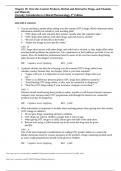
-
Chapter 19: Over-the-Counter Products, Herbal and Alternative Drugs, and Vitamins and Minerals Visovsky: Introduction to Clinical Pharmacology, 9th Edition
- Exam (elaborations) • 9 pages • 2023
-
- $9.49
- + learn more
1. You are teaching a patient about taking over-the-counter (OTC) drugs. Which important safety information should you include in your teaching plan? a. “OTC drugs will only maintain their potency months after the expiration date.” b. “OTC drugs often interact with other drugs, and with food or alcohol” c. “Be sure to take all the pills in the bottle.” d. “Adjust the dosage to your specific needs.” ANS: B OTC drugs often interact with other drugs, and with food or alcohol,...
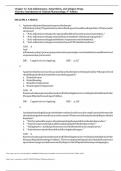
-
Chapter 12: Anti-inflammatory, Antiarthritis, and Antigout Drugs Visovsky: Introduction to Clinical Pharmacology, 9th Edition
- Exam (elaborations) • 9 pages • 2023
-
- $8.49
- + learn more
1. Apatientwithjointinflammationisprescribedanantiinflammatorydrug.Thepatientasksyouhowthisdrugworkstoaddressthisproblem.Whatisyourbe stresponse? a. “Anti-inflammatorydrugsreducepainandlimitbloodvesselresponsestojointinjury.” b. “Anti-inflammatorydrugscontainantibacterialandanti-inflammatoryproperties.” c. “Anti-inflammatorydrugslimitthebody’sresponsetocortisolinthebody.” d. “Anti-inflammatorydrugsincreasethereleaseofTNFandothermediators.” ANS: A Antiinflammatorydrug’s...
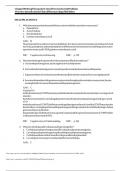
-
Chapter09:DrugTherapyforCentralNervousSystemProblems Visovsky:IntroductiontoClinicalPharmacology,9thEdition
- Exam (elaborations) • 7 pages • 2023
-
- $9.49
- + learn more
1. Whichneurotransmitterhasaninhibitoryactionwithinthecentralnervoussystem? a. Epinephrine b. Acetylcholine c. Norepinephrine d. Gamma-aminobutyricacid ANS: D Neurotransmitterscanbeexcitatoryorinhibitory.Excitatoryneurotransmittersincludeacetylcholi ne(Ach),epinephrine,andnorepinephrine.Inhibitoryneurotransmittersincludedopamine,somet ypesofserotonin,andGABA(gamma-aminobutyricacid). DIF: CognitiveLevel:Knowing REF: p.159 2. HowdoesthedrugtolcaponerelievethesymptomsofParkinsondisease? ...
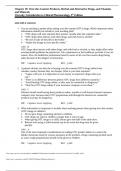
-
Chapter 19: Over-the-Counter Products, Herbal and Alternative Drugs, and Vitamins and Minerals Visovsky: Introduction to Clinical Pharmacology, 9th Edition
- Exam (elaborations) • 9 pages • 2023
-
- $9.49
- + learn more
1. You are teaching a patient about taking over-the-counter (OTC) drugs. Which important safety information should you include in your teaching plan? a. “OTC drugs will only maintain their potency months after the expiration date.” b. “OTC drugs often interact with other drugs, and with food or alcohol” c. “Be sure to take all the pills in the bottle.” d. “Adjust the dosage to your specific needs.” ANS: B OTC drugs often interact with other drugs, and with food or alcohol,...
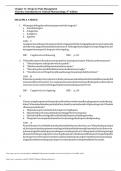
-
Chapter 11: Drugs for Pain Management Visovsky: Introduction to Clinical Pharmacology, 9th Edition
- Exam (elaborations) • 7 pages • 2023
-
- $9.49
- + learn more
1. Whattypesofdrugshavethemainpurposeofrelievingpain? a. Anticholinergics b. Antagonists c. Analgesics d. Agonists ANS: C Analgesicshavethespecificpurposeofrelievingpaineitherbychangingthepatient’sperceptionofp ainorbyreducingpainfulstimulationatitssource.Althoughsomeanalgesicsareopioidagonists,the termagonistisnotspecificforapain-relievingdrug. DIF: CognitiveLevel:Knowing REF: p.213 2. Thehealthcareproviderasksyoutorateapatient’spostoperativepain.Whatisyourbestresponse? a. “Hei...
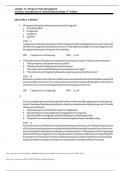
-
Chapter 11: Drugs for Pain Management Visovsky: Introduction to Clinical Pharmacology, 9th Edition
- Exam (elaborations) • 7 pages • 2023
-
- $9.49
- + learn more
1. Whattypesofdrugshavethemainpurposeofrelievingpain? a. Anticholinergics b. Antagonists c. Analgesics d. Agonists ANS: C Analgesicshavethespecificpurposeofrelievingpaineitherbychangingthepatient’sperceptionofp ainorbyreducingpainfulstimulationatitssource.Althoughsomeanalgesicsareopioidagonists,the termagonistisnotspecificforapain-relievingdrug. DIF: CognitiveLevel:Knowing REF: p.213 2. Thehealthcareproviderasksyoutorateapatient’spostoperativepain.Whatisyourbestresponse? a. “Hei...
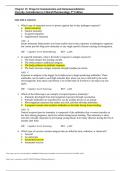
-
Chapter 15: Drugs for Immunization and Immunomodulation Visovsky: Introduction to Clinical Pharmacology, 9th Edition
- Exam (elaborations) • 6 pages • 2023
-
- $9.49
- + learn more
1. Which type of immunity serves to protect against day-to-day pathogen exposure? a. Innate immunity b. Natural immunity c. Acquired immunity d. Supplemental immunity ANS: A Innate immunity helps protect you from smaller day-to-day exposures to pathogenic organism but cannot provide long-term immunity to any single specific disease-causing microorganism. DIF: Cognitive Level: Remembering REF: p.280 2. In acquired immunity, what is the body’s response to antigen exposure? a. The body ...

That summary you just bought made someone very happy. Also get paid weekly? Sell your study resources on Stuvia! Discover all about earning on Stuvia


